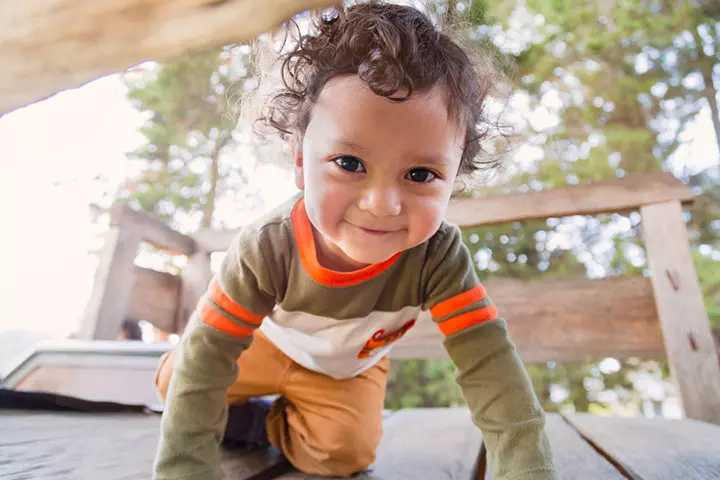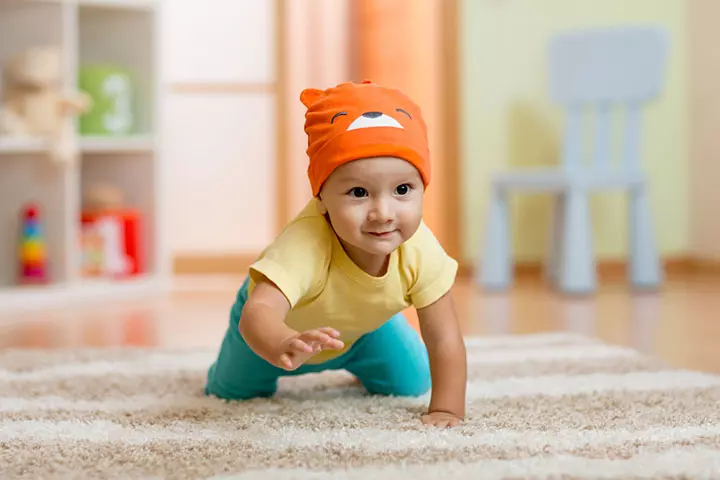
Image: Shutterstock
Navigating the topic of a child who isn’t walking yet can be sensitive. As a parent or caregiver, you might encounter well-intentioned questions and comments that can sometimes be unintentionally hurtful. In this article, we’ll explore some of the things you should not say to a child who hasn’t started walking yet and provide insights into why these comments can be problematic. Read on!
1.”He/She Isn’t Walking Yet?”
The seemingly innocent question, “He/She isn’t walking yet?” may unintentionally imply surprise or judgment. Parents of non-walking children may feel pressured to explain or become self-conscious about their child’s development. Instead, it’s more considerate to express interest in their child’s milestones without conveying concern. Open-ended questions like, “How’s your child’s development coming along?” or “What exciting new things is your child doing?” allow parents to share their child’s progress comfortably. These questions create a positive and non-competitive space for parents to discuss their child’s achievements.
2.”What’s On His/Her Knees? Do They Have Eczema?”
Image: Shutterstock
Commenting on a child’s appearance or skin condition, such as asking, “What’s on their knees? Do they have eczema?” can be insensitive. Children who crawl frequently may naturally have darker knees or minor abrasions. Instead of drawing attention to their skin, it’s better to express curiosity about their activities or interests. By shifting the focus away from their appearance, we create a more positive and understanding atmosphere for parents to share their child’s progress comfortably.
3.”Are They Showing Signs Of Taking A First Step?”
While it’s natural to be excited about a child’s developmental progress and their first steps, repeatedly asking, “Is he/she showing signs of taking a first step?” can inadvertently pressure both the child and their parents. Parents may already be aware of their child’s developmental stage, and constant questioning can intensify their concerns. It’s important to respect each child’s unique developmental timeline. Instead of making walking the central focus of conversation, celebrate all aspects of a child’s growth and development. This approach fosters a supportive and empathetic environment that allows parents to cherish each milestone without undue pressure or comparisons.
4.”They Are Too Big To Be Crawling!”
Image: Shutterstock
Commenting on a child’s size in relation to their developmental milestones, such as saying, “They are too big to be crawling!” can be misleading and insensitive. Children’s growth rates vary widely and aren’t solely determined by their size. Assuming size dictates development is inaccurate and potentially hurtful. Instead, ask questions or express interest in a child’s milestones without making assumptions, creating a more respectful and understanding environment that values each child’s unique growth journey.
5.”My Baby Walked At This Many Months Old”
Sharing your child’s developmental milestones, like saying, “My baby walked at this many months old,” can unintentionally create a competitive atmosphere and make parents of non-walking children feel inadequate or anxious. It’s important to recognize that every child is unique, and their development follows their individual timeline. While it’s perfectly fine to share your own experiences, do so in a way that celebrates the diversity of child development rather than implying one child’s progress is better than another’s. This approach fosters a supportive and empathetic environment where parents can share their joys and challenges without pressure or comparisons.
6.”I Thought Boys Always Walked Earlier”
Image: Shutterstock
Making gender-based assumptions about a child’s development, such as saying, “I thought boys always walked earlier,” is problematic. Gender has no bearing on when a child reaches milestones. Encourage gender-neutral conversations about children’s growth, emphasizing that each child follows their unique developmental timeline. This approach promotes inclusivity and respects individual differences, allowing children to develop at their own pace, free from gender stereotypes.
7.”We Went To A Physiotherapist, And That Really Helped”
Sharing your experience with seeking professional guidance, like saying, “We went to a physiotherapist, and that really helped,” can be valuable. However, it’s important to share this information with sensitivity and respect. Offering unsolicited advice or mentioning interventions without being asked can seem judgmental. Parents usually have reasons for their choices regarding their child’s development, so it’s essential to respect their decisions. Instead of assuming what’s best, express support and empathy. Share your experiences when asked or if parents express concerns. This approach allows parents to make informed decisions based on their unique circumstances and needs while fostering a supportive environment.
Conversations about a child’s developmental journey should always be approached with empathy and sensitivity. Understanding the potential impact of our words and avoiding hurtful or judgmental comments is essential when discussing children who haven’t started walking yet. Every child is unique, and their development unfolds at its own pace. By fostering an environment of inclusivity, understanding, and respect, we can support parents and caregivers in celebrating each child’s individual milestones and growth journey. In doing so, we contribute to a more compassionate and empathetic community that values the diverse paths children take on their way to reaching their developmental milestones.















